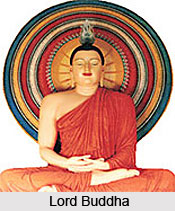 Mahayana Buddhism had developed during the period from Ashoka to Kanishka`s reign. The Mahayanists contend that Buddha is no preacher of penance. He does not shut his eyes to the world when he attains Nirvana, but offers light to it that it may reach its goal. He had said; "I would be a guard to them that have no protection, a guide unto the traveller, a ship, a well spring, a bridge for the seekers of that shore; I would be a lamp to such as need a lamp, a bed for the weary that need a bed, the very slave such as need service".
Mahayana Buddhism had developed during the period from Ashoka to Kanishka`s reign. The Mahayanists contend that Buddha is no preacher of penance. He does not shut his eyes to the world when he attains Nirvana, but offers light to it that it may reach its goal. He had said; "I would be a guard to them that have no protection, a guide unto the traveller, a ship, a well spring, a bridge for the seekers of that shore; I would be a lamp to such as need a lamp, a bed for the weary that need a bed, the very slave such as need service".
Philosophy of Mahayana Buddhism
Though there were doctrinal differences between the Mahayana Buddhism and the Brahmanical views, still the complexion it assumed for its followers was nothing new or unheard of in the times. The Mahayana found that it could capture the peoples` minds only if it gave up the icy coldness of early Buddhism and framed a religion which could appeal to the human heart. It imitated the successful experiments of Hinduism embodied in the theism of the Yoga, of the later Upanishads and of the Bhagavad Gita.
The Mahayana Buddhism gives positive ideas of God, soul and human destiny. The Mahayana or Great Vessel is so called by its adherents in contradiction to Hinayana, or little vessel, of primitive Buddhism. Mahayana Buddhism offers to all beings in all worlds` salvation by faith and love as well as by knowledge, while Hinayana Buddhism only avails to convey over the rough sea of becoming, to the farther shore of nibbana those few strong souls who require no external spiritual aid or the consolation of worship. Mahayana does not require that a man should immediately renounce the world and all the affections of humanity. The Mahayana says that the manifestation of the body of the Law is adapted to the various needs of the children of Lord Buddha. The Mahayana lays as much or greater stress on love, and aims at the salvation of every sentient being, and finds in Nirvana the One Reality, which is "void" only in the sense that it is free from the limitations of every phase of the limited or contingent experience of which we have empirical knowledge. Mahayana requires individuals to take part in the world, evolving new social and religious ideals.
Principles of Mahayana Buddhism
Mahayana Buddhism can in general be characterized by Universalism, in which everyone will become a Buddha. Bodhisattva is the main focus of realization, the vow to strive for Buddha hood or awakened mind both for oneself and for the benefit of all other beings. Compassion through the transferral of merit is a necessity to Bodhisattva .Although compassion is important in all Schools of Buddhism it is particularly emphasized in Mahayana .The idea that acquired merit can be transmitted to others is another important aspect of compassion. Transcendental immanence is an important Buddhist principle. The major philosophies on which Mahayana Buddhism focuses are universalism, enlightened wisdom and compassion.
Religion of Mahayana Buddhism
So far as the Mahayana religion is concerned, there is practically nothing to distinguish it from the religion of the Bhagavad Gita. The metaphysical conception of Dharmakaya, or the ultimate foundation of existence, corresponds to the Brahman of the Gita. As Lord Krishna calls himself the Supreme One, similarly Lord Buddha is made into a Supreme God. He is not an ordinary deity, but the devatideva, the paramount God of gods. He is the creator of all Bodhisattvas.
Ethics of Mahayana Buddhism
The ethical ideal of the Mahayana is the Bodhisattva, as distinct from the arhat of the Hinayana. Bodhisattva literally means "one whose essence is perfect knowledge". But historically it means "one who is on the way to the attainment of perfect knowledge, a future Buddha". The Mahayana does not believe in the possibility of emancipation through one`s own powers. The help of a saviour is necessary. Prayer and worship have a meaning so long as individuals are on the path, though not when one reaches the end. The doctrines of karma, or the continuous working of one`s deeds good or bad, are tempered by mercy, which finds expression in the easier way of salvation by faith. Three classes of Sravakas or hearers, Pratyeka Buddhas, and Bodhisattvas are recognised. Piety is the means adopted by the first, knowledge by the second, devotion to the spiritual weal of others by the third. Mahayana Buddhism had taught that every man could aim at becoming a Bodhisattva, and even low caste men could attain salvation by the practice of virtue and devotion to Buddha. The ethical humanism and universalism characteristic of the Mahayana are quite in the spirit of early Buddhism. The Bodhisattva of the Mahayana still harbours the illusion or the Moha, that he must save the world. In Mahayana the emphasis is not on Nirvana, but on the obtaining of Bodhi or enlightened sainthood. Finally it can be said that the Mahayanists are anxious to focus on the fact that Nirvana is not annihilation.









